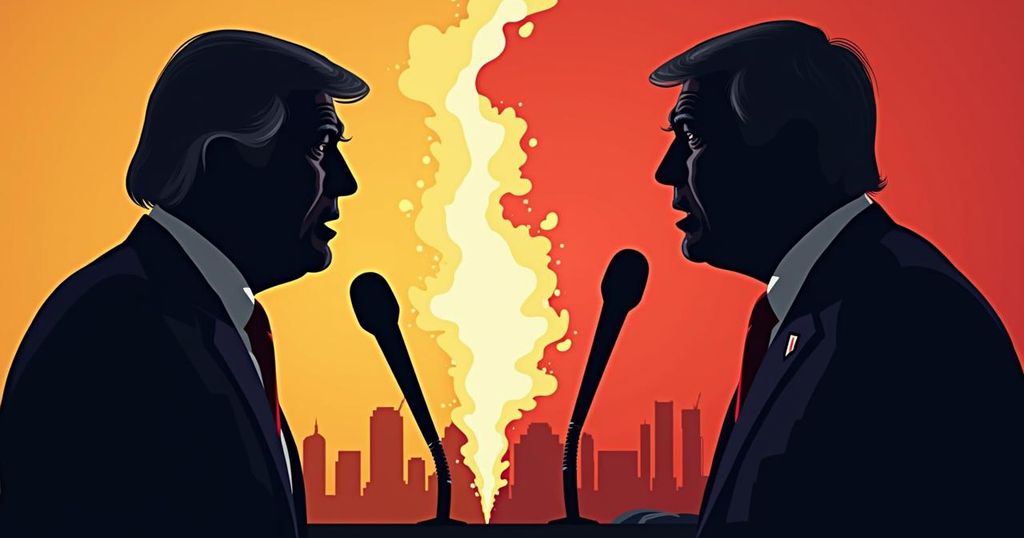On Tuesday, Vice Presidential candidates Senator JD Vance and Governor Tim Walz engaged in a heated debate, addressing crucial issues such as the Middle Eastern conflict, climate change, immigration, and the economy. This debate represents the candidates’ final opportunity for primetime engagement before the election, emphasizing their contrasting views and ties to their respective party leaders.
On the evening of Tuesday, the Vice Presidential candidates, Senator JD Vance (R-OH) and Governor Tim Walz (D-MN), engaged in an intense debate, which is considered the final face-off in the lead-up to the 2024 election. The debate, moderated by CBS, spanned 90 minutes and was characterized by a vigorous exchange of policy positions and critiques of their respective party leaders. A primary focus was the escalating conflict in the Middle East, coinciding with an urgent international crisis as Iran launched 180 ballistic missiles toward Israel. Senator Vance asserted, “Donald Trump actually delivered stability in the world and he did it by establishing effective deterrence. People were afraid of stepping out of line.” In contrast, Governor Walz highlighted the need for steady leadership, stating, “It’s clear, and the world saw it on that debate stage a few weeks ago a nearly 80-year-old Donald Trump talking about crowd size is not what we need in this moment.” The discussion subsequently shifted to the devastating impact of Hurricane Helene and the implications of climate change on such natural disasters. Governor Walz criticized former President Trump’s dismissal of climate change, saying, “There’s no doubt this thing roared onto the scene faster and stronger than anything we’ve seen. Donald Trump calls it a hoax and then jokes that these things would make more beachfront property to be able to invest in.” Conversely, Senator Vance suggested that the Democratic leadership did not genuinely regard climate change as a serious threat, stating, “What the president has said is that if the Democrats, in particular Kamala Harris and her leadership, if they really believe climate change is serious, what they would be doing is more manufacturing and more energy production in the United States of America.” The debate encompassed a wide range of topics, including immigration, healthcare, the economy, abortion, and the controversial outcome of the 2020 election. Notably, both candidates were allowed uninterrupted exchanges as a deviation from traditional debate protocols, leading to some incisive moments, particularly when Walz pressed Vance regarding his views on the 2020 election results. Vance, however, did not provide a direct answer to the inquiry. As the race for the presidential election continues to heat up, this debate marks the last opportunity for the candidates to present their visions to the public, with polling indicating a competitive contest just five weeks prior to Election Day.
The context of the debate involves not only the individual qualifications and positions of the candidates but also broader national issues that impact voter sentiment as the 2024 election approaches. The backdrop includes ongoing international tensions, particularly in the Middle East, and pressing domestic challenges such as climate change and economic recovery. The candidates’ ties to their respective party leaders, particularly former President Trump and his policies, are critical as they debate the future direction of the nation amidst a polarized political environment. This debate serves as a critical platform for both candidates to solidify their positions and appeal to undecided voters in a highly competitive race.
In conclusion, the debate between Senator JD Vance and Governor Tim Walz highlighted significant policy differences between the candidates, particularly with regard to foreign policy, climate change, and various domestic issues. The direct exchanges and the candidates’ contrasting approaches reflect the critical choices voters will face in the 2024 election. With the election date fast approaching, the implications of this debate could resonate with voters as they evaluate the candidates’ capabilities to lead.
Original Source: www.mysuncoast.com






